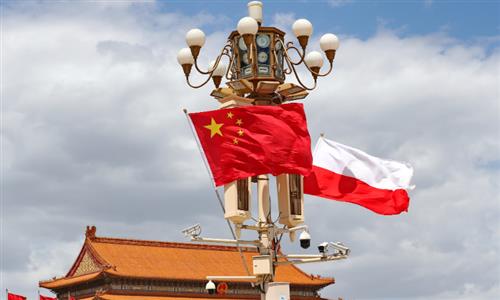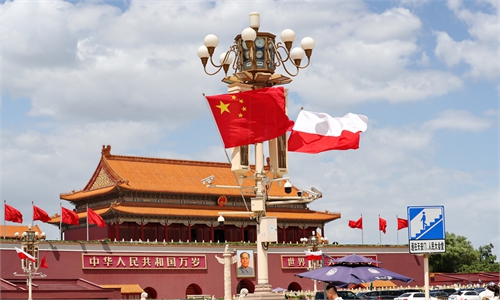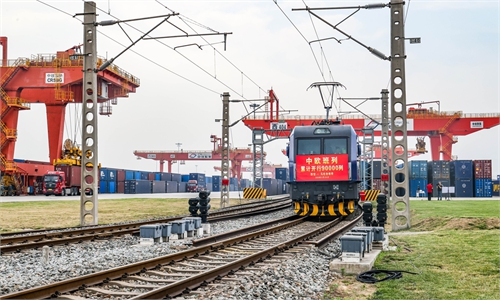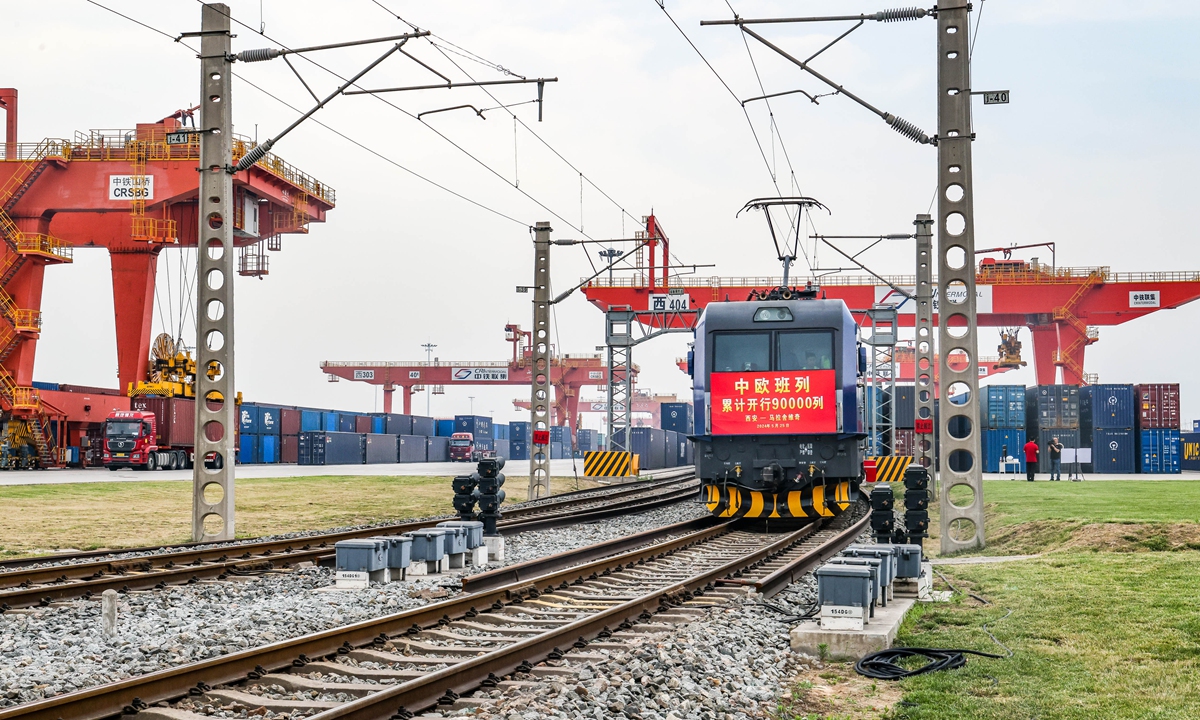
Freight train X8157, the 90,000th China-Europe freight train, heads to Malaszewicze, Poland from Xi'an, capital city of Northwest China's Shaanxi Province on May 25, 2024. Photo: VCG
Editor's note:
As bilateral cooperation between China and Poland gains momentum at the governmental level, there has been a resounding call from the business communities in both nations to escalate and enrich two-way collaboration. This sentiment is particularly pronounced amid Polish President Andrzej Duda's state visit to China, further underscoring the growing eagerness for an enhanced partnership between the two countries.
Global Times reporter Ma Tong (GT) interviewed Han Baohua (Han), President of the Chinese-Polish Chamber of Commerce, discussing the highlights, and prospects of economic and trade cooperation between China and Poland and expectations for the high-level visit.
GT: How do you assess the current state of China-Poland economic and trade cooperation?
Han: Overall, Poland offers a stable business environment conducive to Chinese-funded enterprises. Many Chinese firms have been operating in the country for over three decades, reflecting the stability of trade relations between the two countries.
There is a strong complementarity between the Chinese and Polish economies. As a major agricultural nation, Poland excels in agricultural product exports and has developed advanced food processing technologies. Local enterprises are eager to collaborate with China in these areas of strength.
Considering the current trade levels between the two sides, there is still ample room for economic cooperation. Access to the vast Chinese market is of great importance for the Polish government and enterprises.
As an EU member state and a leader in Central and Eastern Europe, Poland serves as a pivotal gateway for Chinese enterprises seeking European access under the Belt and Road Initiative (BRI).
Strengthening economic engagements with Poland will not only support its ambitions to tap into the expansive Chinese market but also contribute to the sustainable development of Chinese businesses across the broader EU market.
GT: How do you view prospects for trade and what will be the likely highlights of China-Poland economic cooperation?
Han: In recent years, Poland has witnessed rapid economic and industrial growth, fostering a growing interest among Polish businesses to partner with China in both imports and exports. This trend spans traditional industries and emerging high-tech sectors, presenting extensive market opportunities for various forms of Chinese businesses.
Despite facing external uncertainties, I believe both sides will prioritize economic interests. In my view, it's crucial to identify the right entry and establishment methods to maintain and expand Chinese enterprises' presence in Poland and the broader European market.
Looking ahead, the two nations have substantial potential for collaboration in agriculture, cosmetics, machinery, industrial manufacturing, and new energy sectors.
Sectors such as new energy and electric vehicles are pivotal in both current and future growth trends, offering expansive market opportunities. Chinese companies can foster stronger trust with local partners and consumers by localizing their operations.
In addition, they can capitalize on Poland's status as an EU member state, which provides easier access to product certifications. This strategy embodies a mutual benefit principle for all sides involved.
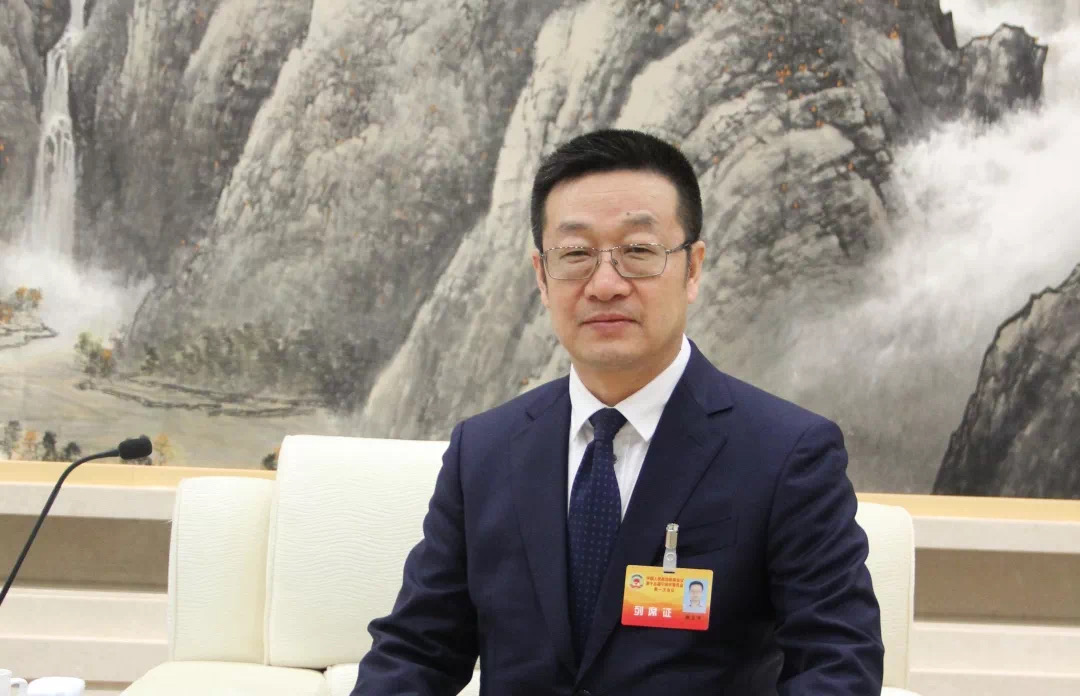
Han Baohua (Han), President of the Chinese-Polish Chamber of Commerce Photo: Courtesy of Han
GT: How do you evaluate the significance and impact of strengthening economic and trade cooperation between China and Poland?
Han: Poland, as a leading country in Central and Eastern Europe, has seen its political and economic influence in the region steadily increase over recent years.
Chinese investments in Poland are significantly boosting local employment, increasing fiscal revenue, and catalyzing growth in its foreign trade and economic sectors. This enduring trend is poised to serve as a model, with potential amplification effects that could propel economic and trade cooperation between China and neighboring nations as well as the broader Central and Eastern European region.
Deepening integration across culture, education, sports, health, and tourism sectors can strengthen interactions between businesses and individuals, thereby alleviating external pressures, promoting mutually beneficial economic outcomes, and reinforcing the comprehensive strategic partnership between the two countries.
GT: Based on your observations and experience, in which areas do Polish enterprises show a stronger eagerness to cooperate with China?
Han: China's status as a globally recognized giant market provides abundant collaboration opportunities for Polish enterprises. Particularly, Polish meat companies are eager to tap into the Chinese market, in addition to products such as seafood, coffee, cosmetics, and handicrafts.
Under the BRI framework, the advantages of bilateral cooperation in logistics and tourism are evident. The Polish government has decided to build a domestic central transport hub to bolster the national railway system, a move that is anticipated to strengthen its role as a crucial logistics and transit hub between China and Europe. This substantial infrastructure endeavor requires support and cooperation from Chinese enterprises.
Furthermore, the increase in direct flights between the two countries in recent years also indicates potential economic benefits. Chinese tourists' visits will not only stimulate local consumer spending but also potentially drive broader employment and economic growth.
GT: Celebrating the 75th anniversary of diplomatic relations between China and Poland, Polish President Andrzej Duda is conducting a state visit to China. As a business leader, what are your expectations for this high-level visit?
Han: As business representatives, we hope for more concrete economic and trade cooperation outcomes during this top-level visit. For instance, as previously proposed, the two countries are planning to jointly establish a China-Central and Eastern European agricultural wholesale market, which represents a win-win opportunity for agricultural sectors and consumers of both sides.
We believe that President Duda's visit is also a response to voices from the Polish industry. As Chinese firms operating in Poland, we strongly advocate for enhanced cooperation between our governments, aiming for mutual harmony and benefit.
This collaboration spans agriculture, technological innovation, and beyond, including not only product exports but also technology transfer and market expansion. It promises to drive economic development and deepen political and cultural exchanges, creating more opportunities and growth prospects for both countries.
I believe the visit will convey a positive message to businesses and people on both sides, as well as globally. We hope it will significantly foster cooperation and a friendly atmosphere between China and Poland, leading to substantial outcomes as anticipated by both parties.
